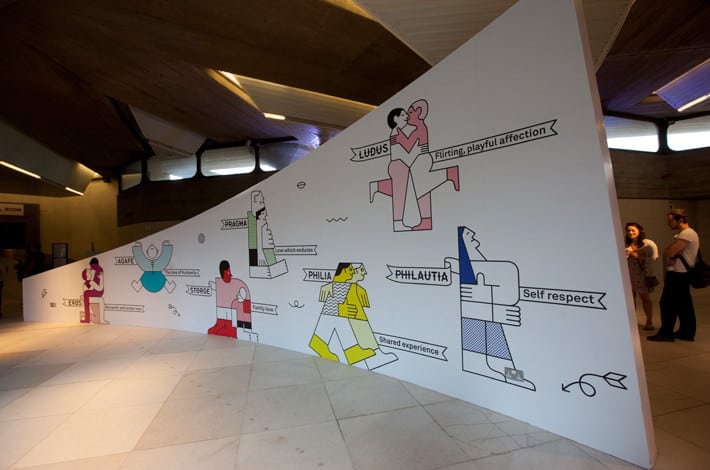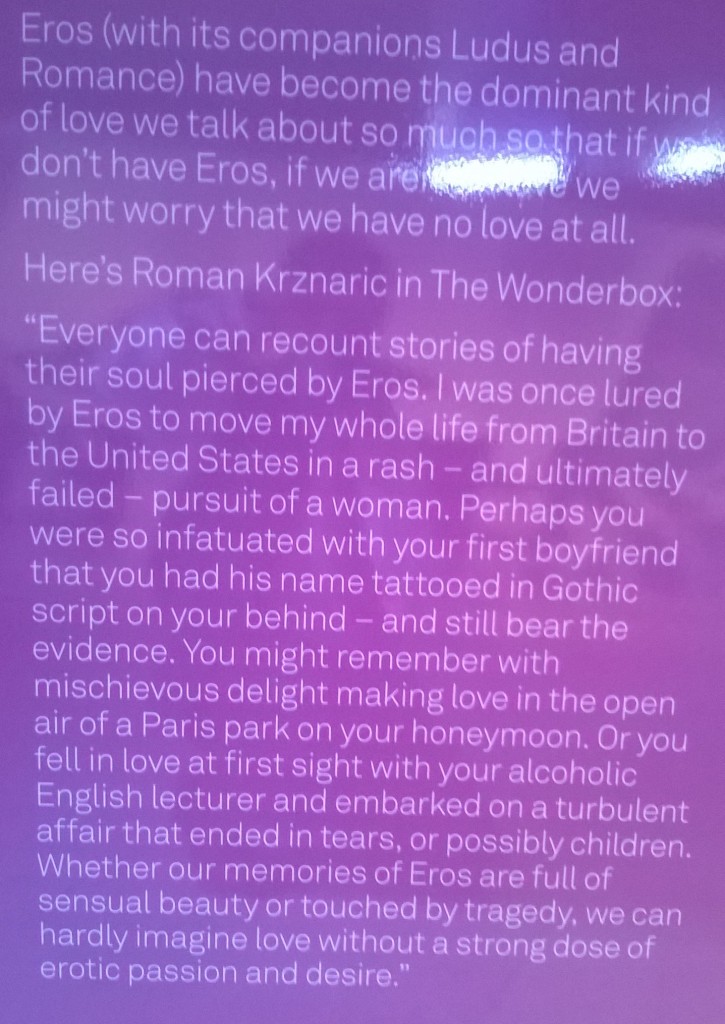 I was recently at London’s Southbank Centre for the launch of their fabulous summer Festival of Love. What made the occasion particularly special for me was that the two-month festival, running throughout July and August, has been based around the different varieties of love in Ancient Greece that appear in my book The Wonderbox. To set the scene I gave the opening talk on these forgotten approaches to the art of loving, discussing eros (sexual passion), philia (friendship), storge (familial love), pragma (mature love), ludus (playful love), agape (selfless love) and philautia (self-love).
I was recently at London’s Southbank Centre for the launch of their fabulous summer Festival of Love. What made the occasion particularly special for me was that the two-month festival, running throughout July and August, has been based around the different varieties of love in Ancient Greece that appear in my book The Wonderbox. To set the scene I gave the opening talk on these forgotten approaches to the art of loving, discussing eros (sexual passion), philia (friendship), storge (familial love), pragma (mature love), ludus (playful love), agape (selfless love) and philautia (self-love).
Afterwards, I spent some time exploring the amazing range of installations, exhibits and events that have been commissioned around the different kinds of love. Right outside the Royal Festival Hall, along the riverside path, I found a giant Temple of Agape. Inside, I discovered a space dedicated to exploring teen Eros and the cult of celebrity, where visitors could dress up and sing karaoke as their favourite pop star.
My favourite exhibit was the Museum of Broken Relationships, which features artefacts donated by former lovers, each telling a story about their break-up – everything from cute teddy bears to shards of glass that were smashed during a final argument. Here’s a short video describing what you will find there (it began in Zagreb, Croatia, and now tours the world).
Along the way I attended some great talks. Shami Chakrabati, the fiery director of human rights organisation Liberty, discussed how love can transform politics. There was a fascinating conversation about depictions of love in the media between the Southbank’s Artistic Director Jude Kelly and Cosmopolitan magazine’s sex expert Rachel Morris, while author James McConnachie explained how the Kama Sutra was about far more than exotic sexual positions.

The festival extended into Queen Elizabeth Hall, where there was an exhibition called What Love Is, containing giant totems to each variety of love, including some revealing quotes from The Wonderbox on each of them, and videos such as the spiritual thinker Jiddu Krishnamurti talking about the relationship between love and loneliness.
I finished off my dip into the festival by joining hundreds of people in Voicelab’s giant Big Love Sing overlooking the Thames, which was quite a personal achievement, since singing in public has long been one of my greatest fears (I have even been known to mouth the words to ‘Happy Birthday To You’ at my children’s birthday parties).
Most gratifying of all was to overhear people young and old casually using Ancient Greek terms like agape and philia as they chatted to their friends. Aristotle would have been impressed. And long may it continue. I truly believe that if we can learn to speak about love in a more nuanced way, we will transform the very nature of our relationships, and expand love beyond the romantic vision to something much deeper and more powerful.
You’ve still got time to get down to the Festival of Love, where there are plenty of events going on alongside the artworks. Coming up on August 16-17 is a Philautia Weekend, dedicated to the love we give to ourselves. The festival culminates on August 30-31 with a Big Wedding Weekend, where couples gay or straight can get married en masse or renew their marriage vows.
Finally, here’s a question to set you thinking: What have you learned about the different varieties of love in the course of your life?
Festivals and events brings excitement to the life and helps people in getting rid of depression who are going through some counseling and therapy as Such events helps in building relation and meeting people and you don’t feel lonely anymore because loneliness is the major reason for depression and anxiety.